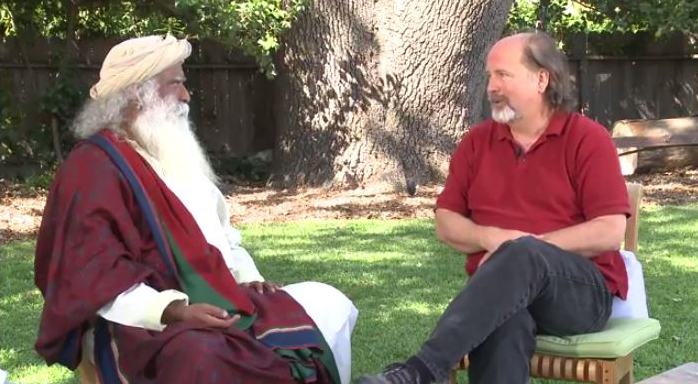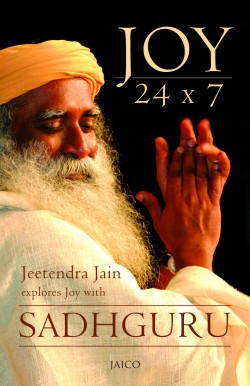In what is perhaps Gautama Buddha’s most-repeated quote, he states, “The root of suffering is attachment.” In our day to day lives, it’s easy to find ourselves becoming attached or entangled with a wide variety of things and people around us, and even ideas and opinions. Over time, these attachments form and shape our personal identities, even without our conscious consent. But are these attachments really the basis of all our suffering?
In a recent visit to the US, Sadhguru joined inventor, scientist, author and engineer Danny Hillis in conversation. Hillis co-founded Thinking Machines Corporation, a company that developed the Connection Machine, a parallel supercomputer designed by Hillis at MIT. He is also co-founder of the Long Now Foundation, Metaweb Technologies, Applied Proteomics, and author of The Pattern on the Stone: The Simple Ideas That Make Computers Work. Throughout his career, Hillis has worked at places like Disney and now Applied Minds, always looking for the next fascinating problem.
During the conversation, Hillis and Sadhguru discussed a range of topics including identity, attachment and the nature of suffering. At one point, shown in the video clip below, Hillis asks, “If you don’t identify with the intellect, and you don’t identify with the body, what do you identify with?”
Sadhguru: “You should try it. (Laughs). See, if you do not identify with the intellect, if you do not identify with the body, what do you identify with? The moment you identify with something, whatever that something is, the nature of the mind is, it’ll work around that, always.
See for example, nationality. In India we have a better experience of this, everybody has but, there are many people here who moved from some other country to United States now, in India what was India was split into 3 countries at one time. So suddenly, you fall on this side of the border, you become one kind of identity, that side of the border, you become another kind of identity. The moment you identify that ‘I am an Indian,’ just a piece of cloth flies, flutters in the air, tears will come – you know, a flag. People are willing to live for it, die for it. But if you are on the other side of the thing, this flutters, you hate it.
So I’m saying the identity, the nature of identity is such, whatever you get identified, the mind will instantly wrap itself around that because that is an instrument of self-preservation. If you identify with the body, immediately it’s working around this to preserve this. If you identify with a larger idea, it will wrap itself around that. It’s so wrapped around that, you’re willing to shed the body for the nation.”
Danny: “So you’re saying identify with nothing?”
Sadhguru: “How can you identify with nothing? If your identity is taken off, if you consciously shed your identity – if you sit here, like this, if you keep your hands here it just stays here – just like that your mind will become. If you want, you can use it. Otherwise you can just keep it.”
Danny: “Just like that.”
Sadhguru: “Just like that. It is ruling the way it is ruling simply because you’re identified with things you are not.”
Danny: “This is something that I find very easy to – it’s very compatible with my views as a scientist to think that the things that we identify ourselves with are fairly arbitrary, like our body or our conscious stream of thought, or you know, our knowledge or something like that – “
Sadhguru: “Family, nation, this, that, ideologies, everything -“
Danny: ” – and so I’m very comfortable with the idea that we have for convenience – for survival as you said – we construct a model of the world in which there are certain objects and they have certain properties and we’re one of the ‘objects’ and we have boundaries and properties – but that’s just made up. That’s just a model that we made up. It’s only an approximation that’s useful for certain purposes but it’s not really the nature of reality. It’s something that we’ve imposed upon reality for our own understanding. That I’m very comfortable with, that notion.
What is hard for me is to know how to put that in a, how to put that into practice in a useful way. Because the thing that I know how to do, of course, is to manipulate that model and work with that model and…that’s the thing that I’ve done all my life, and so even though I recognize that it’s only a model, it has limitations, I don’t know what else to do.”
Sadhguru: “It’s not that you have to do something different with what you’re doing around you, but something different with yourself. You don’t have to change what you’re doing outside, but the reason why I’m talking to you today is, if somebody’s competent enough to do things which could make life better, which could create fantastic things in the world, such a mind, such a human being should not suffer the limitations of identity.”
Danny: “I love that idea. I wish I knew how to do it.”
Sadhguru: “I can do it for you. (Laughs) I can put you through a simple process with which you can do. The basic process that we teach people is just this – if you sit here, in your experience – this is not hallucinating – in your experience your body’s here, your mind is somewhere here, what is ‘you’ is elsewhere. Do not give it any other name, what is ‘you’, but distinctly, your experience of who you are is little away from you, your body and your mind, or your intellect at least. Once there is a little distance between your intellect and your body from who you are, these are the only two sources through which human beings normally acquire any kind of unpleasantness and suffering. We can make your body suffer by poking it. Or we can make your mind suffer – this doesn’t need poking, most people are on self-help.”
Danny: “You’re poking me right now.” (Laughs)
Sadhguru: “These are the only two sources of suffering. Once there is a little distance or space, this is the end of suffering. Only when the fear of suffering is entirely removed from you, only when the possibility of suffering is taken away from you, you’ll walk full stride. Otherwise every human being is only half a step, because always the question is ‘What will happen to me?’.
Watch the Conversation:







